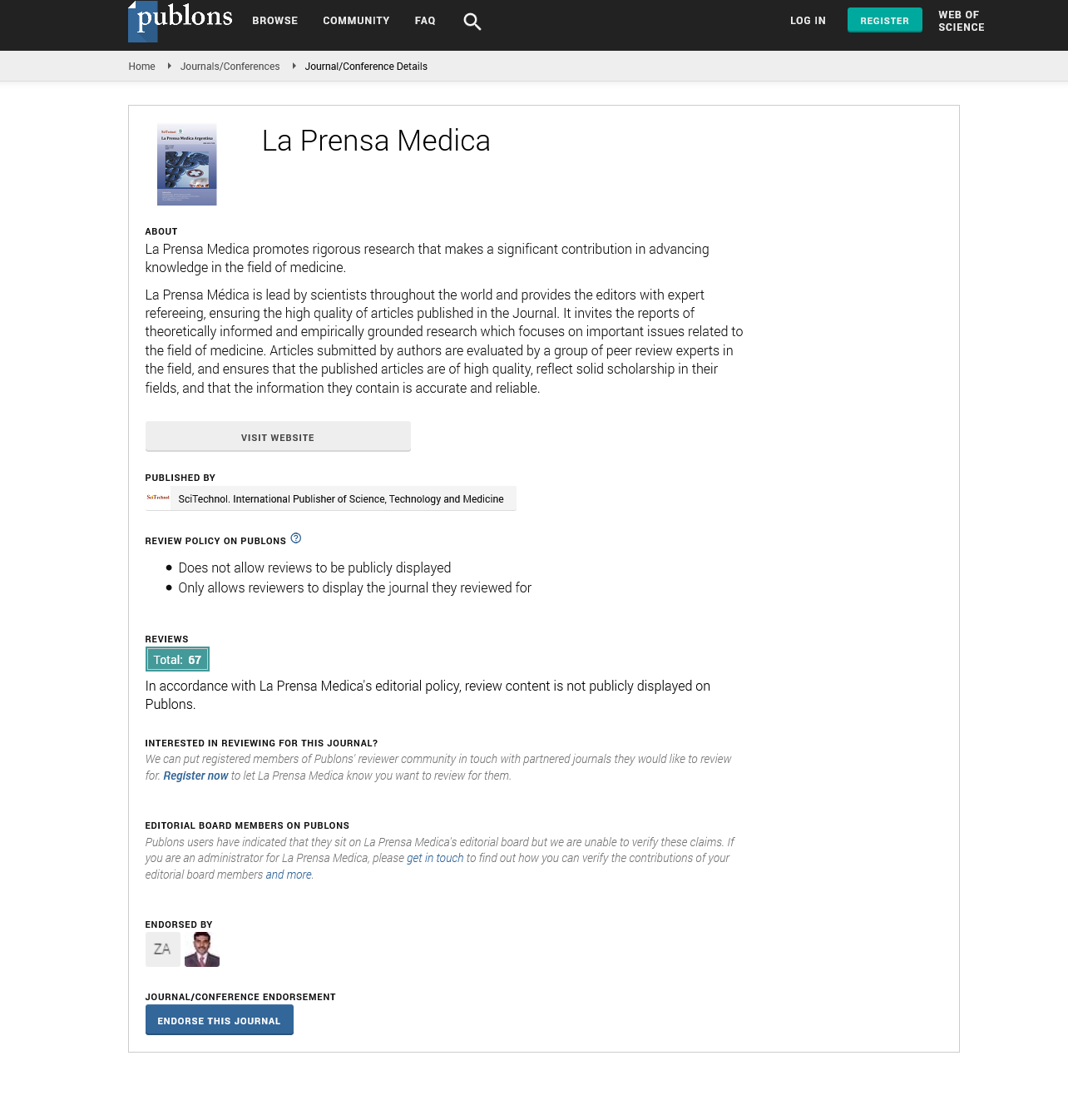Opinion Article, La Prensa Medica Vol: 109 Issue: 4
Antimicrobial Resistance: Novel Approaches to Combat the Growing Threat of Drug-Resistant Microorganisms
Kimura Choouko*
1Department of Bacteriology, Nagoya University Graduate School of Medicine, Nagoya, Japan
*Corresponding Author: Kimura Choouko,
Department of Bacteriology,
Nagoya University Graduate School of Medicine, Nagoya, Japan
E-mail: choouko@kimura-hu.ac.jp
Received date: 30 October, 2023, Manuscript No. LPMA-23-111727;
Editor assigned date: 01 November, 2023, PreQC No. LPMA-23-111727 (PQ);
Reviewed date: 16 November, 2023, QC No. LPMA-23-111727;
Revised date: 23 November, 2023, Manuscript No. LPMA-23-111727 (R);
Published date: 30 November, 2023, DOI: 10.4172/2324-8955.1000675
Citation: Choouko K (2023) Antimicrobial Resistance: Novel Approaches to Combat the Growing Threat of Drug-Resistant Microorganisms. La Prensa Medica 109:4.
Abstract
The rise of Antimicrobial Resistance (AMR) has emerged as a global health crisis, posing a significant threat to public health, healthcare systems, and medical advancements. Microorganisms, including bacteria, viruses, fungi, and parasites, have developed the ability to withstand the effects of antimicrobial drugs, rendering previously effective treatments ineffective.
Description
The rise of Antimicrobial Resistance (AMR) has emerged as a global health crisis, posing a significant threat to public health, healthcare systems, and medical advancements. Microorganisms, including bacteria, viruses, fungi, and parasites, have developed the ability to withstand the effects of antimicrobial drugs, rendering previously effective treatments ineffective. This article delves into the escalating challenge of AMR and explores innovative strategies and approaches aimed at tackling this urgent threat.
Understanding antimicrobial resistance
Antimicrobial resistance occurs when microorganisms evolve mechanisms to counteract the effects of antimicrobial agents, making infections more difficult to treat and increasing the risk of severe illness and mortality. Factors contributing to the emergence of AMR include the overuse and misuse of antibiotics in human and veterinary medicine, as well as inadequate infection prevention and control practices. The global spread of drug-resistant microorganisms is facilitated by international travel, trade, and interconnected healthcare systems.
The consequences of AMR are wide-ranging and profound. Routine medical procedures such as surgeries, cancer treatments, and organ transplants become riskier due to the potential for post-operative infections that are resistant to available treatments. Furthermore, the economic impact of AMR is significant, straining healthcare systems, increasing healthcare costs, and leading to longer hospital stays.
Novel approaches to combat AMR
Phage therapy: Phage therapy involves the use of bacteriophages, viruses that infect and kill bacteria, to target drug-resistant pathogens. Phages are specific to certain bacterial strains, offering a tailored approach to treatment. Research in phage therapy has gained renewed interest as an alternative to antibiotics. Clinical trials are underway to explore the efficacy and safety of phage therapy against infections that are difficult to treat with traditional antibiotics.
Crispr-cas technology: The revolutionary CRISPR-Cas technology, known for its gene-editing applications, is also being explored in combating AMR. Researchers are investigating the use of CRISPR-Cas systems to target and disarm genetic elements responsible for drug resistance in bacteria. This approach holds the potential to reverse resistance and restore the effectiveness of existing antibiotics.
Combination therapies: Combination therapies involve the simultaneous use of multiple drugs or treatment modalities to address drug-resistant infections. By targeting different pathways or mechanisms within microorganisms, combination therapies aim to enhance treatment effectiveness and delay the development of resistance. This strategy has shown promise in tuberculosis treatment and addressing multidrug-resistant bacterial infections.
Antimicrobial peptides: Antimicrobial peptides are naturally occurring molecules with potent antimicrobial properties. They can disrupt the cell membranes of bacteria, fungi, and viruses. Researchers are exploring the potential of antimicrobial peptides as an alternative to traditional antibiotics. Both naturally derived and synthetically designed peptides are being investigated for their effectiveness and safety.
Vaccines and immunotherapy: Vaccines play a crucial role in preventing infections and reducing the need for antibiotics. Research efforts are focused on developing vaccines against bacterial infections that commonly develop resistance. Additionally, immunotherapies are being explored to enhance the host's immune response against infections, thereby reducing the reliance on antimicrobial agents.
Repurposing existing drugs: Drug repurposing involves identifying existing drugs that exhibit antimicrobial properties against drug-resistant pathogens. Since these drugs have established safety profiles, the path to clinical use can be accelerated. Researchers are screening libraries of approved drugs to identify candidates that could be effective against drug-resistant.
Conclusion
Antimicrobial resistance represents a pressing and complex challenge that demands collaborative efforts from healthcare professionals, researchers, policymakers, and the public. Novel approaches to combat AMR hold the potential to revolutionize our ability to treat infections effectively. Phage therapy, CRISPR-Cas technology, combination therapies, antimicrobial peptides, vaccines, immunotherapy, and drug repurposing are innovative strategies that offer hope in the fight against drug-resistant microorganisms. It's essential to recognize that addressing AMR requires a multifaceted and global approach. Improved infection prevention and control practices, responsible antibiotic use, and international cooperation are paramount.
 Spanish
Spanish  Chinese
Chinese  Russian
Russian  German
German  French
French  Japanese
Japanese  Portuguese
Portuguese  Hindi
Hindi 

